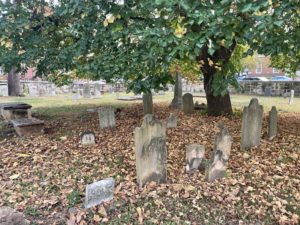Shelley Nguyen hasn’t landed on a career choice yet, but she’s already contemplating what kind of legacy she wants to leave.

“It’s important to think about how I want to live my life,” said Nguyen, a University of Mary Washington sophomore and international affairs major who spends a few minutes each morning jotting down notes in a gratitude journal. “I’m glad I’m already figuring these things out.”
She began to think along those lines during one of her first courses at Mary Washington: Literature of Death and Purpose. Introduced right before COVID hit in spring of 2020, the timely class covers two millennia of prose and poetry grappling with grief, loss and life’s meaning. In addition to literary analysis, students write letters to their 80-year-old selves, practice connecting with strangers, visit cemeteries and take photos to illustrate what brings them joy. Projects like these have helped them process the pandemic and reflect on what the late poet Mary Oliver – whose work “The Summer Day” made it onto the syllabus – called their “one wild and precious life.”
Conceived and taught by Professor of English Marie McAllister, whose research explores the intersection of literature and medicine as well as 18th-century works, the class was originally meant to focus on health. But, as she began developing it three years ago, McAllister found many pieces that wrestled with death, illness, pain and suffering.
“I thought, ‘Wow, that’s pretty bleak,’” she said, “but much of what has been written about death is actually about how to live our best life while we still can. Once I realized the course should also be about purpose, it came together really quickly.”
McAllister borrowed concepts from Norma Bowe, an education professor and former nurse who teaches a popular course on death at New Jersey’s Kean University, and from sociology and psychology departments across the country. “It gave me insight into some of life’s hardest truths,” said senior Chandler Carlson, a biochemistry and psychology double major, who felt the class helped him prepare for his future medical career.
Most of the readings – spanning from Ancient Rome to just a few years ago – are poetry, such as Emily Dickinson’s “Because I Could Not Stop for Death” and Dylan Thomas’ “Do Not Go Gentle Into That Good Night.” But a 2005 essay, “Always Go to the Funeral,” resonated most with junior Emma Parker.
“It taught me that no matter how busy or caught up we get in our own lives, showing up for others will always make a difference,” said Parker, a communication and digital studies major who feels the course helped her cope when the pandemic death toll started to rise. “It was so comforting to have a community of people who were trying to make sense of grief and loss during this unprecedented time.”
One assignment includes writing goodbye letters to the deceased, former friends and lovers, and even to graduations, proms and other rites of passage cancelled due to COVID. Students also pen personal accomplishment lists, play games that prompt challenging conversations about life and death, and engage in laughing yoga. “I got some raised eyebrows with that one,” McAllister said. “We all felt silly but had a lot of fun.”
A creative writing major, senior Tristan Barber said putting together a giving list – think “bucket list” with ways to give back to others – and an end-of-life planning document gave him clarity.
“Death is inevitable, but it doesn’t need to dominate our lives,” said Barber, who has lost several friends and family members. “This course helped me understand my own experiences, alleviated anxieties and gave me a new perspective on my life and work.”







Inspiring article
thanks for teaching and students who participated
lovely idea making best of Covid experience